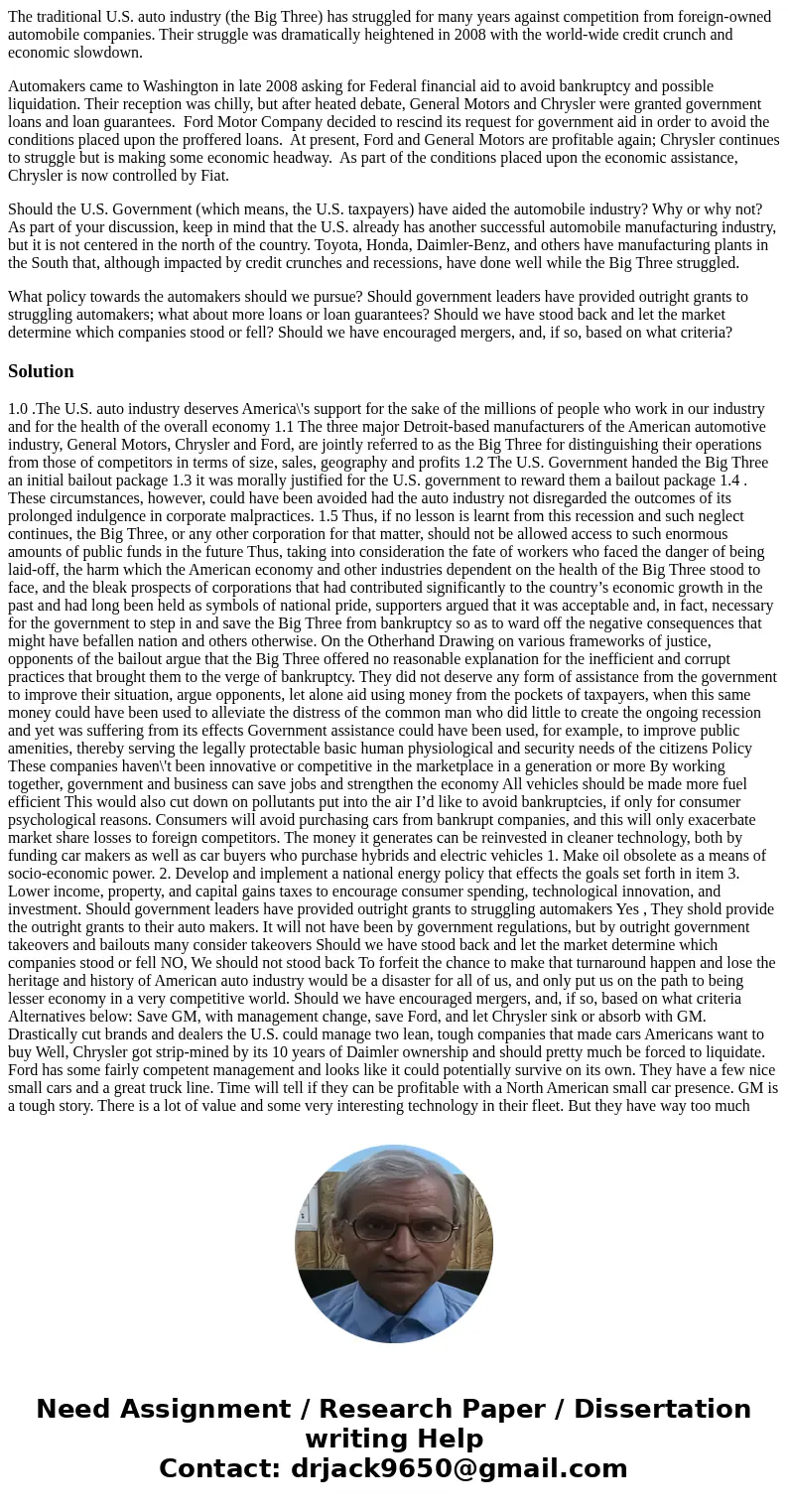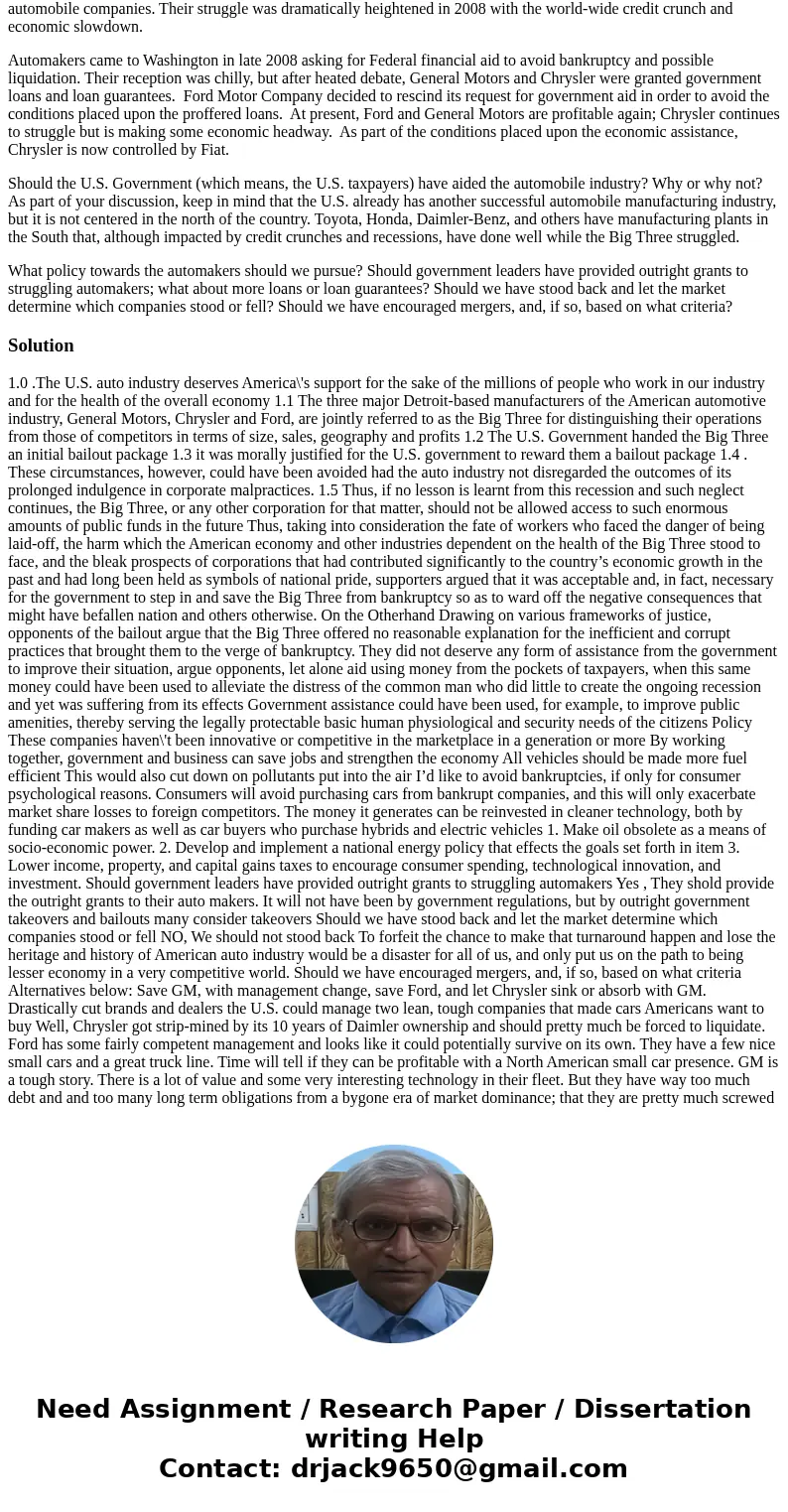The traditional US auto industry the Big Three has struggled
The traditional U.S. auto industry (the Big Three) has struggled for many years against competition from foreign-owned automobile companies. Their struggle was dramatically heightened in 2008 with the world-wide credit crunch and economic slowdown.
Automakers came to Washington in late 2008 asking for Federal financial aid to avoid bankruptcy and possible liquidation. Their reception was chilly, but after heated debate, General Motors and Chrysler were granted government loans and loan guarantees. Ford Motor Company decided to rescind its request for government aid in order to avoid the conditions placed upon the proffered loans. At present, Ford and General Motors are profitable again; Chrysler continues to struggle but is making some economic headway. As part of the conditions placed upon the economic assistance, Chrysler is now controlled by Fiat.
Should the U.S. Government (which means, the U.S. taxpayers) have aided the automobile industry? Why or why not? As part of your discussion, keep in mind that the U.S. already has another successful automobile manufacturing industry, but it is not centered in the north of the country. Toyota, Honda, Daimler-Benz, and others have manufacturing plants in the South that, although impacted by credit crunches and recessions, have done well while the Big Three struggled.
What policy towards the automakers should we pursue? Should government leaders have provided outright grants to struggling automakers; what about more loans or loan guarantees? Should we have stood back and let the market determine which companies stood or fell? Should we have encouraged mergers, and, if so, based on what criteria?
Solution
1.0 .The U.S. auto industry deserves America\'s support for the sake of the millions of people who work in our industry and for the health of the overall economy 1.1 The three major Detroit-based manufacturers of the American automotive industry, General Motors, Chrysler and Ford, are jointly referred to as the Big Three for distinguishing their operations from those of competitors in terms of size, sales, geography and profits 1.2 The U.S. Government handed the Big Three an initial bailout package 1.3 it was morally justified for the U.S. government to reward them a bailout package 1.4 . These circumstances, however, could have been avoided had the auto industry not disregarded the outcomes of its prolonged indulgence in corporate malpractices. 1.5 Thus, if no lesson is learnt from this recession and such neglect continues, the Big Three, or any other corporation for that matter, should not be allowed access to such enormous amounts of public funds in the future Thus, taking into consideration the fate of workers who faced the danger of being laid-off, the harm which the American economy and other industries dependent on the health of the Big Three stood to face, and the bleak prospects of corporations that had contributed significantly to the country’s economic growth in the past and had long been held as symbols of national pride, supporters argued that it was acceptable and, in fact, necessary for the government to step in and save the Big Three from bankruptcy so as to ward off the negative consequences that might have befallen nation and others otherwise. On the Otherhand Drawing on various frameworks of justice, opponents of the bailout argue that the Big Three offered no reasonable explanation for the inefficient and corrupt practices that brought them to the verge of bankruptcy. They did not deserve any form of assistance from the government to improve their situation, argue opponents, let alone aid using money from the pockets of taxpayers, when this same money could have been used to alleviate the distress of the common man who did little to create the ongoing recession and yet was suffering from its effects Government assistance could have been used, for example, to improve public amenities, thereby serving the legally protectable basic human physiological and security needs of the citizens Policy These companies haven\'t been innovative or competitive in the marketplace in a generation or more By working together, government and business can save jobs and strengthen the economy All vehicles should be made more fuel efficient This would also cut down on pollutants put into the air I’d like to avoid bankruptcies, if only for consumer psychological reasons. Consumers will avoid purchasing cars from bankrupt companies, and this will only exacerbate market share losses to foreign competitors. The money it generates can be reinvested in cleaner technology, both by funding car makers as well as car buyers who purchase hybrids and electric vehicles 1. Make oil obsolete as a means of socio-economic power. 2. Develop and implement a national energy policy that effects the goals set forth in item 3. Lower income, property, and capital gains taxes to encourage consumer spending, technological innovation, and investment. Should government leaders have provided outright grants to struggling automakers Yes , They shold provide the outright grants to their auto makers. It will not have been by government regulations, but by outright government takeovers and bailouts many consider takeovers Should we have stood back and let the market determine which companies stood or fell NO, We should not stood back To forfeit the chance to make that turnaround happen and lose the heritage and history of American auto industry would be a disaster for all of us, and only put us on the path to being lesser economy in a very competitive world. Should we have encouraged mergers, and, if so, based on what criteria Alternatives below: Save GM, with management change, save Ford, and let Chrysler sink or absorb with GM. Drastically cut brands and dealers the U.S. could manage two lean, tough companies that made cars Americans want to buy Well, Chrysler got strip-mined by its 10 years of Daimler ownership and should pretty much be forced to liquidate. Ford has some fairly competent management and looks like it could potentially survive on its own. They have a few nice small cars and a great truck line. Time will tell if they can be profitable with a North American small car presence. GM is a tough story. There is a lot of value and some very interesting technology in their fleet. But they have way too much debt and and too many long term obligations from a bygone era of market dominance; that they are pretty much screwed

 Homework Sourse
Homework Sourse